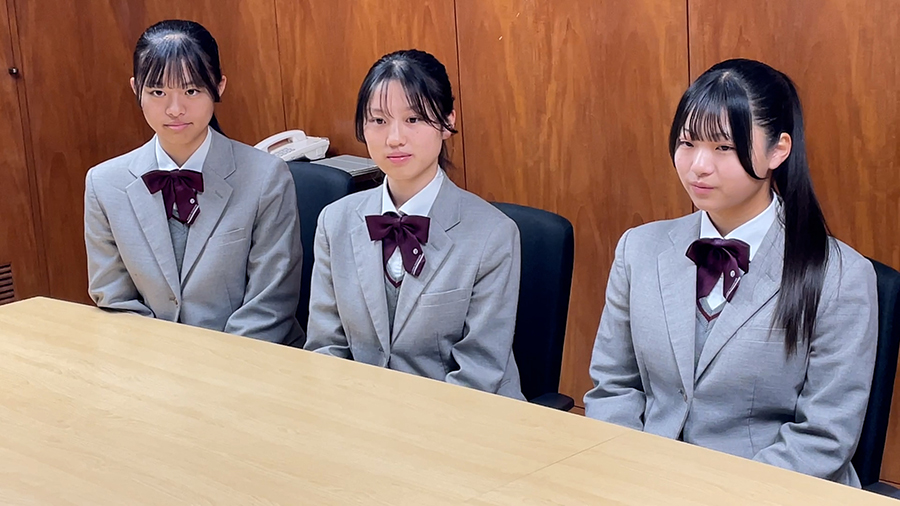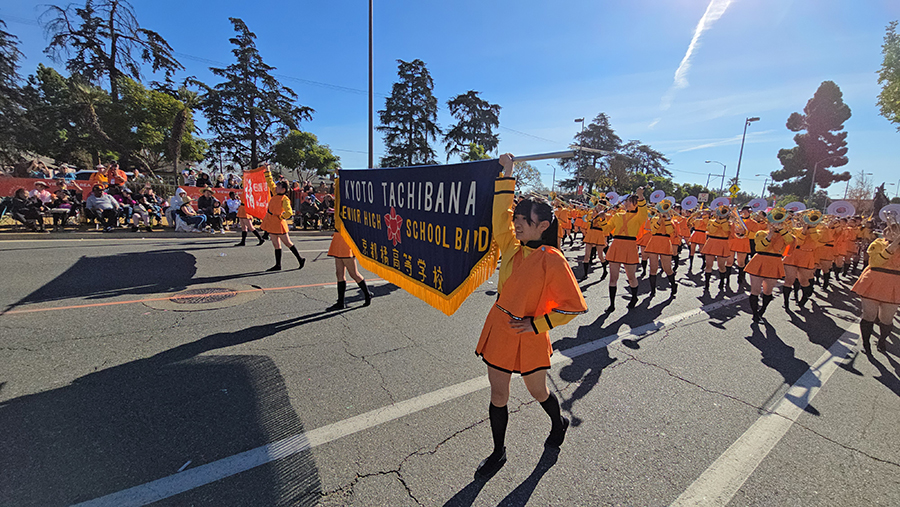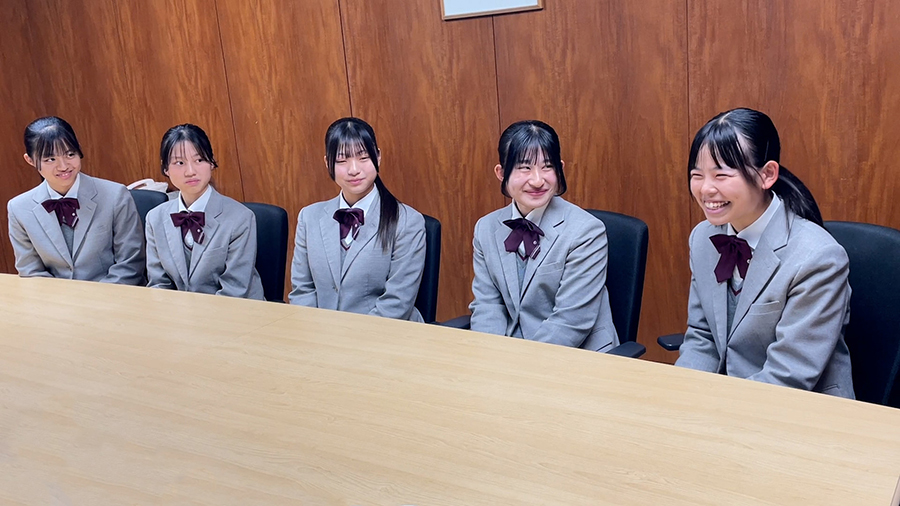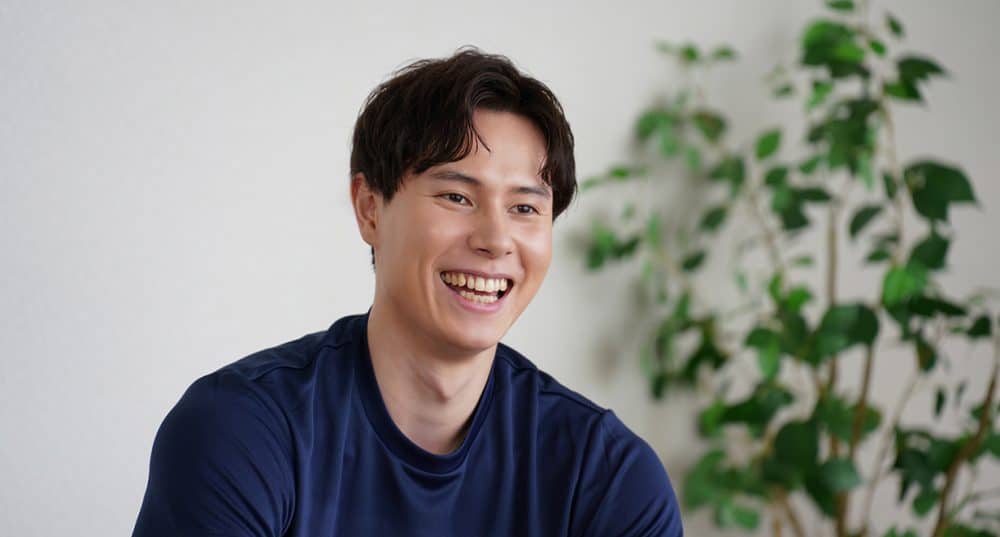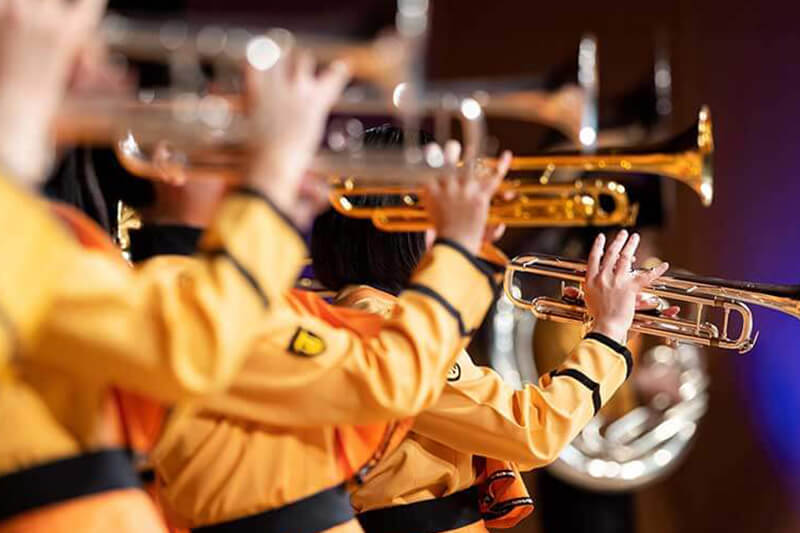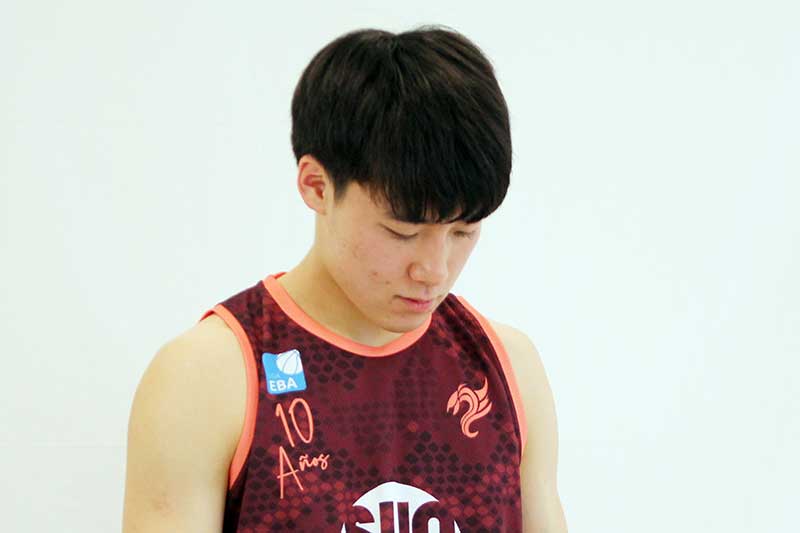Journal
サン・クロレラの取り組みや
サポートするアスリートたちのTOPICS。
Find out about Sun Chlorella's corporate activities and sponsored athletes
Kyoto Tachibana Senior High School Band
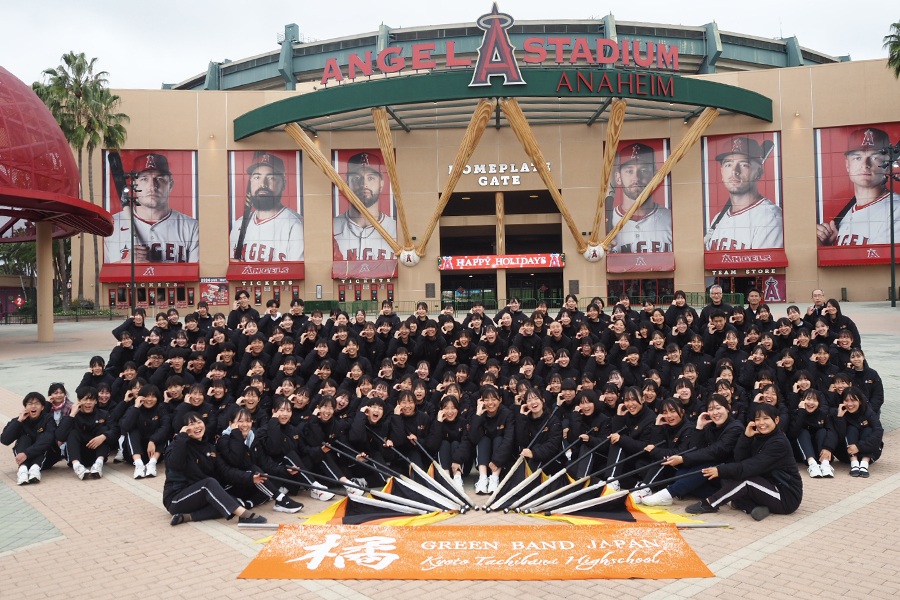
Recognized as one of Newsweek Japan’s “100 Japanese People the World Respects” in 2023, and having received a video message directly from then President Tsai Ing-wen of Taiwan, the Kyoto Tachibana Senior High School Band has been establishing its reputation across the world. Expectations were high this year, especially because for the first time in seven years, the band was to perform at the Rose Parade, where they first garnered worldwide attention with their nickname, the Orange Devils.
This year, with Kumagai (club president and alto saxophonist) and Kamata (drum major), both of whom we interviewed last year, and Fujiwara (vice president and alto saxophonist), Takahama (vice president and euphonium player), and Oyama (the next club president and clarinet player / percussionist) as the key members, the band worked through various changes and took on new challenges like never before.
In this first half of the interview, we focus on their thoughts on band practice and the changes and challenges they experienced.
A year full of challenges, all for a sparkling performance
Since the band celebrated its 120th anniversary last year, its members were determined to tackle this year with renewed determination. They were expected to add another year to their record of winning the All Japan Marching Contest for three consecutive years, and moreover, they were scheduled to perform at the Rose Parade in Los Angeles for the first time in seven years. But on top of the mounting expectations from the people around them, the band members were all the more eager and motivated.
With heightened emotions and quiet commitment, the Kyoto Tachibana Senior High School Band kick-started their 121st year with “Sparkle the Hearts” as their theme. They hoped to perform to add some sparkle in the hearts of not only themselves, but also their teachers and staff, parents and guardians, fans, and everyone around the world who would watch them perform at contests as well as online.
Kumagai: We tried a lot of new things this year. I think our team developed a sense of solidarity through our efforts of incorporating spirit boosting ideas into our daily practice, like wearing matching headbands and shouting out loud our personal goals.
Fujiwara: When the new academic year began, we made some significant changes to our club roles. For example, we combined overlapping roles such as healthcare and clean-up into a single role of health and hygiene. We also made new roles. We made these changes so that we can run our club more efficiently, and I think they’re working. They’re ideas that we came up on our own, and the experience allowed me to reacknowledge the importance of trying new things.
Takahama: Taking on new challenges requires a lot of courage and trying things we’ve never done before can make us feel worried about failing. But this year, everyone on our team was truly eager to improve our club. I think this year we showed a lot of guts.
Oyama: I am a second-year student and watching the seniors proactively take on new challenges gave me courage. I think that our attempts of incorporating new routines such as saying our goals out loud and wearing matching headbands allowed us to refine our communication, and I think this mood that it’s okay to be proactive and try new things has been passed on to the juniors.
Kamata: Every one of our team members this year was shining bright. We tried to share that shine by touching the hearts of our audience through our performance. That was our theme for this year, which is why we were determined to shine our brightest every time we performed.
Individual steps forward for the team to make great strides
How can a performer give some sparkle in the hearts of every single person involved in a performance? After much thinking, the band members reached a conclusion that they had to change their own mindset as well as their environment during practice sessions. Various changes took place, naturally and self-driven. The previous environment was not insufficient by any means; their efforts were rather out of concern that they would not be able to achieve better results unless they got out of their comfort zone. This proactive and forward-thinking attitude is what led them to take on new challenges.
Kumagai: The third-year students in the club all got along to begin with. While we reminded ourselves to inspire and encourage one another to practice harder, there were many moments where we empathized and supported each other, which I think is what led us to have a stronger emotional bond as a team. Our drive to change something was especially strong during contest season, since there were many years when our band couldn’t participate in the Kansai Contest. So, we did a lot of thinking and tried out various ideas. The headbands and shouting things out loud were a part of those efforts.
Kamata: Needless to say, sometimes there was tension in the air when a contest was coming up. But our team was able to come together, with our club president in the center, which then brought us a sense of confidence. When practice sessions did not go so well, we thought constructively and focused on how we should move on or improve our efficiency. Our club was not only about rigor and staying strong, but also about being kind and joyful to overcome any obstacles. There were a lot of things I learned this year.
Fujiwara: When I was in my first and second year of high school, all I could do was think about myself. But when I became vice president, I had to pay attention to my colleagues and surroundings. I became aware of how the team was performing, what was lacking, and what we needed. Of course it was hard at first, but growing to grasp the whole team has allowed me to get a better sense of what I should be doing compared to when I was only focusing on myself. I have more emotional leeway. The things that I couldn’t see until my seniors told me, I see them on my own now. Furthermore, taking on a role who talks in front of people has enabled me to refine my speech so that it’s more understandable and convincing. My communication skills have definitely improved.
Takahama: The greatest change for me was that I learned to take ownership of my words and actions. When I was in my first and second year, I was just following along what my seniors and teachers have decided. Even if I made mistakes, I wasn’t held responsible. But now that I am in my third year and became the vice president, I have responsibilities. If I don’t say or act with responsibility, I can’t gain the trust of my friends or juniors. In that sense, I think I’m more mature now.
Oyama: I play the contrabass in a seated performance, and when marching I play the clarinet. There aren’t many members who play two different instruments, which is why I think I was too self-determined and had a hard time relying on my band members. Furthermore, when no one among my third-year bandmates played the contrabass when I was in my second year, I became the section leader, which turned out to be more than I could handle. That’s when I turned to my same-year colleagues for advice. I learned that I wasn’t alone. The good part about being in a club is that other club members are also there with you.
Kamata: My voice is quiet and I’m not that extroverted, so I was never someone who stands in front of people and keeps a team together or give directions as a leader. So, when I was appointed as the next drum major at the end of my second year, I wondered if I could really do it, given that the Rose Parade was also coming up. But after a year of being the drum major, I feel grateful because I think I became more confident, independent, and proactive as the leader of marching, discussing with other leaders, drill writing members, and coaches about what methods we should take to practice more efficiently.
Kumagai: I am the opposite of Kamata. I used to be the self-assertive type. But being a third-year student and the club president required me to see the club objectively instead of just following my ego. For example, on days I feel down, I noticed how the entire brass band including the juniors were influenced. Being the club president allowed me to see myself from a third-person perspective and think about how I should hold myself together as the leader. I think I became more mature in the sense that I became aware of how other people may be looking at me.
Gold prize with all A’s after much effort and personal growth
Band members of the 121st generation have been courageous and enthusiastic about taking on new challenges to polish their shine even brighter to realize their theme of performing in a way that adds some spark in people’s hearts. Their hard work began to pay off around late summer and led them to achieve a significant success in the All Japan Marching Contest. Not only did they win the gold prize, which was expected of them since they are a competitive band but also received all A’s on the evaluation from all seven judges—a feat that none of their seniors in the past have ever achieved.
Kumagai: Our efforts paid off. That’s all I could think of when I first heard the news. For a while, I was just gratefully savoring the joy of it and at the same time flooded with so many emotions. Honestly, when we finished performing, I didn’t think that we would get all A’s. After the contest ended and we received the gold prize, we were having our final meeting outside of the venue when Coach Shima told us, “You won the gold prize with all A’s!” I couldn’t believe it was true, and I was like, really? As the club president, I witnessed so many difficulties that we all worked through together over the past year. Which is why I was overwhelmed with this sense that everything finally paid off.
Kamata: It was our last marching contest as the third-year members in the club. We worked so hard for the gold prize but also aimed at achieving all A’s on top of it. Which is why the news made me go weak at the knees! For a performance as short as six minutes, we came up with a lot of potential choreography, drew so many storyboards, and went through countless trials and errors. Being the drum major of our band up on that stage has allowed me to feel a different kind of joy compared to previous years. After the performance, I was just so happy and kept on jumping up and down.
Fujiwara: The experience that left the biggest impression on me was how we gradually changed our style of playing our instruments by discussing amongst ourselves, despite that we were playing the same song since the Kyoto Prefecture preliminaries. Experimenting with a lot of things to achieve a finalized version of our performance has enabled us to feel truly confident. With drum major Kamata in the center, we all had the same motivation in mind throughout the year. I even saw how the drill writing members were drawing storyboards late at night to make some improvements in our performance. Trying new things made me worried at times, but we ended up with a hard-earned success of winning the gold prize with all A’s. I was filled with joy, because we were right about what we’ve been doing all along.
Takahama: Personally, I felt pressure from having to win the gold prize for the fourth consecutive year, so as soon as I found out that we won it, it felt as if a weight has been lifted off my shoulders. So, the moment I heard that we received all A’s, I felt almost confused—I felt lightheaded, and the whole thing felt like I was in a dream. The accomplishment that even the seniors whom we respect so much have never achieved before—that was our goal that we were determined to fulfill. We practiced hard every single day, and as a result, we made it, and I was happier than ever.
Oyama: I have to say that I caused some trouble right before the contest, so after our performance and we were sitting in the audience, and it was announced that we won the gold prize for four years in a row, I was so relieved that I couldn’t help but cry. Then, when we were all outside of the venue and heard that we got all A’s, I saw my senior colleagues so happy and hugging each other. I slowly realized that I was witnessing a very special moment. And it made me feel inspired and determined, thinking to myself that next year, I would be the one making this scene happen and showing it to our colleagues and juniors.
Not only did the members add another year to break their record and win the gold prize for four consecutive years, but they also courageously took on new challenges and defined their own goals to chase after. The 121st year members succeeded in receiving all A’s, the first in Kyoto Tachibana Senior High School’s history. With the excitement of the All Japan Marching Contest still lingering, the Rose Parade, their next big challenge, was approaching.
